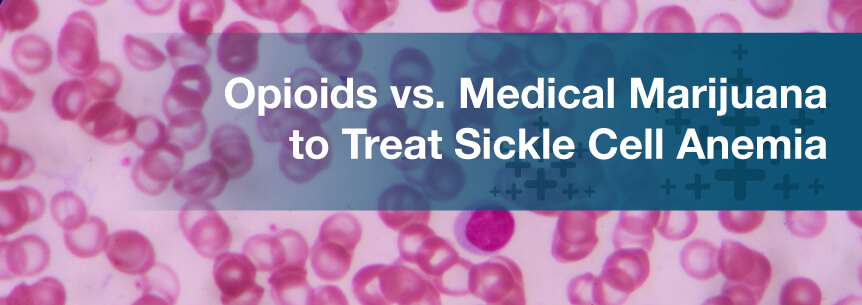
Although there is still no cure for sickle cell anemia, patients can significantly improve their quality of life and manage the disorder’s symptoms when they work closely with their doctors to find appropriate treatment methods. For adolescent and adult sufferers, the inherited blood cell disorder’s most prominent side effect is severe and chronic pain.
When normal pain medications, like over-the-counter meds, don’t work, doctors will prescribe something stronger to help patients manage their discomfort. Opioids are medications derived from opium or synthetically produced to mimic the compounds in opium. Although these drugs work, for the most part, they can cause severe symptoms. In some cases, patients become addicted and struggle with a substance abuse problem for the rest of their lives.
But, with many states passing legislation approving medical marijuana for certain conditions, cannabis is becoming a viable alternative to prescription opioids.
Sickle cell anemia is an inherited condition. Patients with the disorder have red blood cells that become misshapen, appearing crescent or “sickle” shaped. Unlike healthy blood cells, which are round and easily flow through blood vessels, sickle cells are sticky and misshapen, so they often get stuck and build up in smaller blood vessels.
When the circulatory system becomes congested like this, it can lead to sudden, severe pain called a sickle cell crisis. These attacks come without warning and can be excruciating for patients, lasting anywhere from a few hours to weeks.
When the pain is unmanageable, it’s not uncommon for patients to be rushed to the hospital to be treated with IV therapy, where doctors provide fluids and powerful pain medicines like morphine.
According to the CDC, the prescription opioid abuse epidemic causes 115 overdose deaths a day in the United States. However, even if a patient doesn’t become dependent on this form of medication, some severe side effects can occur due to the regular use of opioids, including:
However, the potential development of a drug tolerance is what most healthcare professionals are concerned about. As this happens, patients require more opioids to feel the same beneficial effects. They can become dependent on opioids to the point that they can’t function without them, and any attempt to reduce the prescription or wean the patient off the drugs leads to serious withdrawal symptoms.
Because of the staggering amount of opioid overdose deaths in the United States, physicians are searching for an alternative pain management option. Medical marijuana could be the solution.
In the search to find a viable alternative to prescription opioids, cannabis medication has come forth as a frontrunner. Whereas opioids block pain receptors in the brain, the cannabinoids in marijuana work with our body’s endocannabinoid system (ECS), which features receptors found in every major bodily system. Since cannabinoids mimic these receptors, they’re able to provide many different health benefits.
One of the most important benefits for patients with sickle cell anemia is their analgesic effect, allowing the same pain relief prescription opioids provide, but with less negative side effects — and no deaths associated with its use.
If your sickle cell anemia is causing chronic pain, don’t become dependent on prescription pain medications when there is a more positive alternative. Medical marijuana has been legalized in many states throughout the U.S. to treat chronic and severe pain. Search our database to find a marijuana doctor near you today to see if you qualify for your state’s compassionate cannabis program.